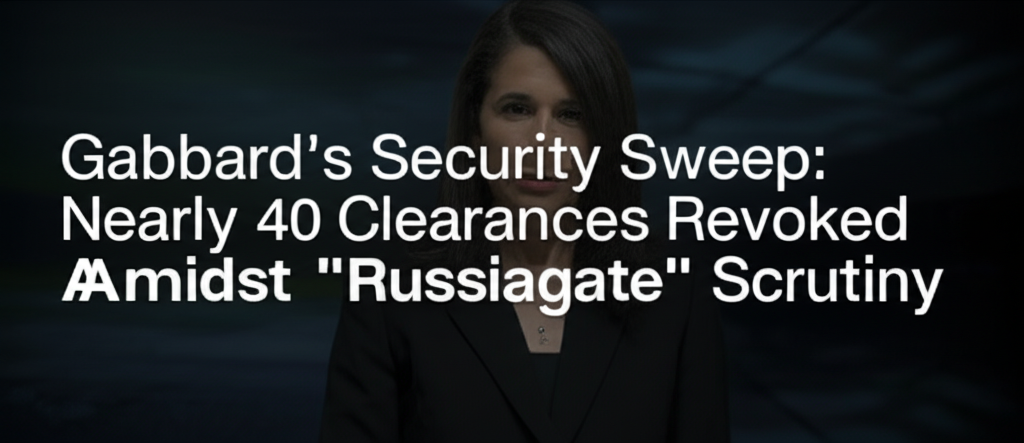Gabbard’s Security Sweep: Nearly 40 Clearances Revoked Amidst “Russiagate” Scrutiny
Former Intelligence Officials Among Those Affected as Administration Re-evaluates Access
A Brief Introduction On The Subject Matter That Is Relevant And Engaging
In a move that has sent ripples through the intelligence community and political circles, former Congresswoman and Presidential candidate Tulsi Gabbard, now in a prominent national security role, has reportedly revoked the security clearances of nearly 40 individuals. This significant action comes in the wake of ongoing debates and investigations surrounding the origins and implications of “Russiagate,” a period of intense scrutiny over alleged Russian interference in U.S. elections. The individuals affected include former high-ranking intelligence officials, raising questions about the administration’s approach to national security personnel and the lingering impact of past controversies.
Background and Context to Help The Reader Understand What It Means For Who Is Affected
Security clearances are a vital component of national security, granting individuals access to classified information deemed essential for their roles. The revocation of such clearances is a serious measure, typically undertaken when there are concerns about an individual’s reliability, judgment, or potential risk to national security. The timing of these revocations, specifically mentioning the “Russiagate fallout,” suggests a connection to the broader investigations and public discourse surrounding intelligence assessments and their handling during the Trump administration. For those affected, including former intelligence leaders like James Clapper, the revocation means a loss of access to sensitive information and potentially impacts their ability to contribute to ongoing national security discussions or advise on related matters.
The individuals whose clearances have been revoked are reportedly former intelligence officials, some of whom were vocal critics of the Trump administration and played prominent roles in the investigations into Russian interference. This has led to speculation that the revocations are politically motivated, aimed at silencing or marginalizing dissenting voices within the national security apparatus. Conversely, proponents of the action might argue that it is a necessary step to ensure that only individuals with current and absolute trustworthiness and loyalty are granted access to sensitive information, irrespective of their past service or public statements.
In Depth Analysis Of The Broader Implications And Impact
The implications of these widespread revocations extend far beyond the individuals directly impacted. Firstly, it signals a potential shift in how national security personnel are vetted and managed within the current administration. The emphasis on “Russiagate fallout” suggests a re-evaluation of past intelligence assessments and the conduct of individuals involved in them. This could lead to a broader reassessment of the intelligence community’s handling of politically sensitive investigations and the potential for partisan influence on intelligence analysis.
Secondly, the action may exacerbate existing divisions within the intelligence community and the broader national security establishment. For those who feel that the “Russiagate” narrative was overblown or politically weaponized, these revocations could be seen as an attempt to vindicate certain viewpoints or punish those who supported them. This could foster an environment of caution and self-censorship, potentially hindering open debate and the free exchange of ideas crucial for effective intelligence gathering and analysis.
Furthermore, the revocation of clearances for former high-ranking officials, who often possess deep institutional knowledge and experience, could represent a loss of valuable expertise. While the administration has the prerogative to ensure personnel trustworthiness, strategically sidelining experienced former officials, especially those who have been critical of past policies or actions, could have unintended consequences for national security strategy and continuity.
The public perception of these actions is also a significant factor. If the revocations are perceived as politically motivated retribution, it could further erode public trust in both government institutions and the intelligence agencies. Transparency in the justification for these revocations, while challenging due to the classified nature of clearances, will be crucial in shaping this perception.
Key Takeaways
- Nearly 40 security clearances have reportedly been revoked, impacting former intelligence officials.
- The revocations are linked to the “Russiagate” investigations and fallout.
- The move has sparked debate about political motivations versus national security imperatives.
- This action could have significant implications for the intelligence community’s internal dynamics and public trust.
- The loss of experienced personnel is a potential concern for national security strategy.
What To Expect As A Result And Why It Matters
Looking ahead, it is likely that the revocations will continue to be a subject of intense political and media scrutiny. Legal challenges from some of the affected individuals are also a possibility, further amplifying the debate. For the intelligence community, this may usher in a period of increased caution and potentially a more conservative approach to personnel management and the expression of dissenting views.
The long-term impact on the intelligence community’s ability to attract and retain talent, particularly those with diverse perspectives, remains to be seen. If the environment is perceived as overly punitive or politically charged, it could deter individuals from entering public service or from speaking candidly about critical national security issues. This matters because a robust, diverse, and intellectually honest intelligence community is fundamental to protecting national interests and informing policy decisions.
Moreover, the ongoing narrative surrounding these revocations contributes to a broader societal discussion about the role of intelligence in a democracy, the potential for its misuse, and the importance of accountability for those who handle classified information and shape public perception of sensitive events.
Advice and Alerts
Individuals with existing security clearances, particularly those with a history of public commentary on politically charged national security matters, may wish to review their current standing and consider the potential implications of their public statements. It is advisable to remain informed about policy changes and to seek guidance from official channels if there are concerns regarding one’s clearance status. For the public, it is important to critically assess information regarding these events, seeking out a range of credible sources to form a comprehensive understanding of the motivations and consequences involved.
Annotations Featuring Links To Various Official References Regarding The Information Provided
While the provided source is from The Daily Caller, which is a news outlet, and specific official documentation for individual clearance revocations is typically not made public for privacy and national security reasons, the following resources offer general context on security clearances and the organizations involved:
-
U.S. Department of State – Security Clearances: Provides general information on the purpose and process of obtaining security clearances.
-
Office of the Director of National Intelligence (ODNI): The ODNI oversees the U.S. Intelligence Community, which includes many of the agencies from which individuals might have held clearances. This site offers insights into the broader intelligence community structure and mission.
-
Central Intelligence Agency (CIA) – Security Clearance: Offers specific information on the CIA’s security clearance process, illustrating the rigorous standards applied within intelligence agencies.


